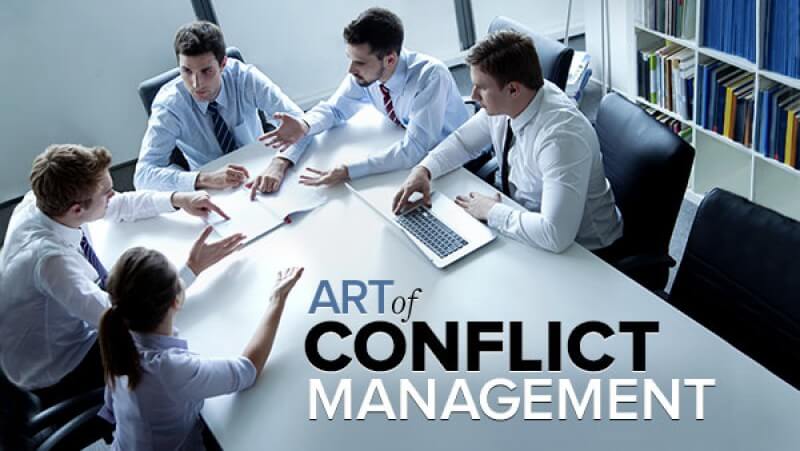Art of Conflict Management: Achieving Solutions for Life, Work, and Beyond
$215 Original price was: $215.$49Current price is: $49.
Shopping Instructions:
- DISCOUNT 15% : SHOP15
- Product Delivery: Within 1 – 12 hours after purchase.
The lectures abound with examples producing similar realizations. Professor Dues repeatedly reveals conversational pathways that make File size: 11.39 GB
Art of Conflict Management: Achieving Solutions for Life, Work, and Beyond
Conflict is everywhere, something we all experience on a regular basis. Whether it’s learning that your spouse has a different kind of vacation in mind than you do or that your boss’s idea of your job differs from your own, conflict is simply an inevitable aspect of human relationships. As desirable as it might seem, there’s just no way to live a conflict-free life.
Handled badly, conflict can do real harm, both to you and the people you care about the most. It can cripple your career and the businesses you work for. And it can leave its scars on your community and even your nation.
Handled well, however, conflict can be extraordinarily useful. If you have the skills needed to identify and resolve conflict, it can actually be your ally. It can help you identify and solve problems. And it can build deeper and stronger relationships, whether with your coworkers, supervisors and subordinates, or your closest friends and loved ones.
Most of us, though, haven’t been lucky enough to have been taught those vital skills or to have learned the ways in which factors like perspective, emotions, goals, and power can create or drive a conflict. For better or worse, we’ve had to pick things up as we went along, beginning in our homes or schoolyards and going on from there. All with uneven results that can play out for the rest of our lives, burdening us with a default conflict “style” that may be dysfunctional at best and seriously harmful at worst.
The Art of Conflict Management: Achieving Solutions for Life, Work, and Beyond is an opportunity for you to gain those essential skills. Its 24 lectures are brimming with practical tips, tools, and techniques everyone can use to better manage conflict in his or her professional and personal lives, which receive equal emphasis in the course.
Strategies and Tactics You Can Use Right Now
Presented by Professor Michael Dues of The University of Arizona—an award-winning teacher, writer, author, and successful consultant to both public and private organizations—these lectures will show you how to effectively deal with conflicts of all kinds, using the “win-win” model that has dominated the field for the past six decades.
- You’ll gain effective techniques for handling conflicts in your workplace, other organizational settings, or your personal life, whether you’re dealing with supervisors, coworkers, acquaintances, close friends, or family members.
- You’ll learn the best ways to analyze conflicts and work through the steps toward resolving them, including clarifying goals, handling difficult emotions, and negotiating agreements.
- And you’ll grasp the fundamental tricks of the trade that experienced negotiators have long used to deal with even the most seemingly intractable moral and cultural conflicts.
While drawing on the latest groundbreaking research, Professor Dues has designed this course to be as practical as possible. Requiring no background in conflict management, negotiation, or psychology, the lectures offer you not just knowledge, but strategies and tactics you can put to work in your own life right now.
See the Best Conflict Management Techniques in Action
Best of all, you’ll be able to see those strategies and tactics in action. Professor Dues has crafted 70 professionally acted dramatizations to illustrate different conflict situations at home and in the workplace.
Most of these situations will be familiar to all of us, undoubtedly echoing similar conflicts we’ve experienced in our own lives. And as you watch them unfold, you’ll grasp far more than what works and what doesn’t. You’ll understand why.
Moreover, to ensure that you gain a true working feel for the dynamics at play in each of these situations, Professor Dues ends each lecture with a simple yet provocative “assignment.”
He asks you to focus on events in your own life in which those same dynamics have been felt, and to then apply what you have just learned in evaluating your own statements and actions. There’s no better way to get a real handle on a conflict you know well and to see immediately what needs to happen to resolve it.
Even something as simple as offering an apology, for example, takes on a whole new light after you learn the five components that must be included if an apology is to be truly accepted and effective. And while most of us probably believe we already know how to apologize, it’s likely that many of our own apologies might not include all of these essentials:
Get immediately download Art of Conflict Management: Achieving Solutions for Life, Work, and Beyond
- A specific statement of the offending behavior
- An acknowledgment that it was harmful
- Our assumption of responsibility for both the behavior and the harm done
- An admission of regret
- Our commitment to not repeat the behavior
Discover New Realizations about the Conflicts in Life
Time after time, you’re likely to catch yourself in a quick one-two punch of realization after Professor Dues makes a telling point, or after a pair of dramatizations illustrates the right and wrong way we can communicate during a conflict:
Realization No. 1: Well, of course. That makes sense. I probably knew that already. Quickly followed by…
Realization No. 2: I don’t think I actually said it that way the last time I was in that situation. Maybe that’s why things didn’t work out as well as I had hoped.
The lectures abound with examples producing similar realizations. Professor Dues repeatedly reveals conversational pathways that make all the sense in the world, but that we might not necessarily take or even consider on our own. By folding these insights into the findings of six decades of research and presenting the material in easily digestible form, he succeeds in leaving you with knowledge that manages to be both eye-opening and intuitive.
That knowledge becomes a toolbox of techniques you can put to work today, not only preventing as many conflicts as possible but equipping you to manage in the best possible way the ones that do take place in spite of your best efforts.
One of the most remarkable points Professor Dues makes is how even the most seemingly intractable conflicts can be eased toward resolution by these techniques. His riveting descriptions of how they have been put to use on the world stage—including President Carter’s creative eliciting of empathy during the Camp David negotiations between Israel and Egypt—offer profound examples of how powerful these techniques can be.
And while your own conflicts may not seem to rise to a similar scale, there is no mistaking the impact they can have on your own world, where your relationships—at work, with friends, or with family—define your success and happiness.
You don’t have a choice about becoming involved in conflict. You do, however, have a choice about learning to manage it successfully and about using the invaluable tools this course can give you.
Related products
Business & Sales
Dan Kennedy (GKIC) – The Source Code to Business Success and Advanced Wealth Attraction
Business & Sales
Business & Sales
Business & Sales
Business & Sales
Business & Sales
Business & Sales












